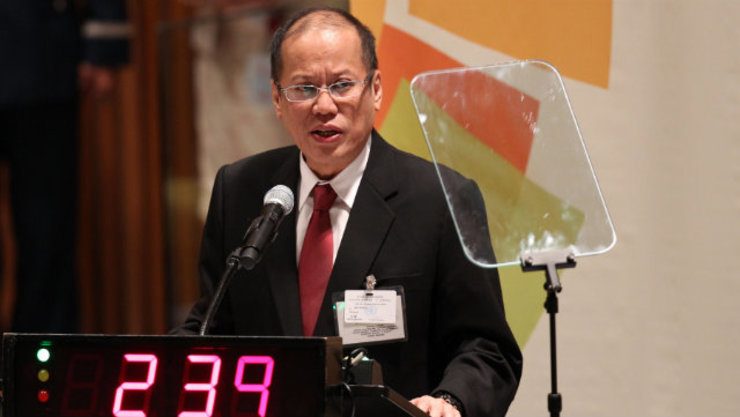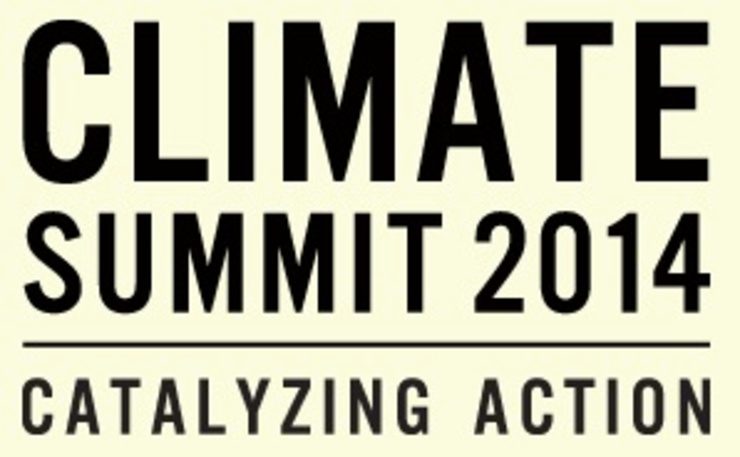SUMMARY
This is AI generated summarization, which may have errors. For context, always refer to the full article.

UNITED NATIONS (UPDATED) – President Benigno Aquino III said the Philippines aims to transition to renewable energy but needs funds and technology from the international community.
Addressing his counterparts here at the UN Climate Summit, Aquino urged them to help the Philippines ensure a “climate smart development” while dealing with extreme weather events like Super Typhoon Yolanda (Haiyan).
“We have never lacked to resolve… transitioning towards less traditional sources of energy. What we lack is the access to technology, financing investment that will allow us to accelerate our strategy,” Aquino said at the UN Headquarters in New York on Tuesday, September 23.
He then asked fellow heads of state and government to give the Philippines financial and technological support for climate change adaptation and mitigation.
“I believe the challenge before us is to innovate on ways in which the transfer of useful technology and the building of climate smart infrastructure [which] might be achieved under a global unity of effort,” Aquino said in his 4-minute speech.
The Philippines and other developing nations have been calling on developed countries, especially the top greenhouse gas emitters, to commit to give them funds and technology as they suffer from being in the frontlines of climate change.
The President did not announce any new commitment of the Philippines in combating climate change, contrary to the expectation of climate activists. (READ: 5 things Aquino should say in his UN Climate Summit speech)
“Let the first concrete commitment we make be a change in mindset from one arguing over the division of work to one where we’ll do the maximum we can: always asking what more can we do?”
Aquino is among 120 heads of state and government attending the summit, the biggest ever gathering of world leaders, business executives, and civil society groups on climate change. US President Barack Obama is participating in the event but the leaders of the two other top-emitting countries, China and India, are absent.
The Philippines is the third most disaster-prone country in the world, according to the World Disasters Report 2012, next to Tonga and Vanuatu.
Improving energy mix?
Aquino discussed the issue of climate justice, pointing out that the Philippines directly experiences the adverse effects of climate change like Haiyan, which claimed 6,000 lives and affecting more than 3 million families.
“It will not be an exaggeration to say that Filipinos bare a disproportionate amount of the burden when it comes to climate change. Being less industrialized, we are not a major emitter,” he said.
“The rise of water levels, the loss of islands, the growing frequency and intensity of typhoons present a real challenge to every country especially those in the developing world such as ours.”
Still, Aquino outlined the steps the Philippines has taken to combat climate change, including legislation on disaster response, empowering forecasting agencies like weather bureau PAGASA, geohazard mapping, and a national re-greening program “on top of an intensified anti-illegal logging campaign.”
“The Philippines is not waiting. We are addressing climate change to the maximum with our limited resources.”
Aquino added that the country is also monitoring public spending on climate change adaptation and mitigation measures to ensure that funds are properly spent.
The President then said that the Philippines, which has experienced fast economic growth under his watch, aims to use clean energy in striving for development.
“As early as 2008, we have passed a Renewable Energy Act and we are now treading a climate smart development pathway. We continue to take steps to maintain and even improve our low emission development strategy and the trajectory of our energy mix.”
Aksyon Klima Pilipinas, a network of 40 civil society organizations, criticized Aquino’s “misleading” statements.
“To say that ‘we have never lacked resolve’ in shifting to renewable energy is a blatant lie, especially when we have about 40 coal plants just waiting to be built,” said Denise Fontanilla, advocacy officer of Aksyon Klima Pilipinas.
“He even ridiculed solar and wind energy advocates in his State of the Nation Address last year.”
Fontanilla added that Aquino could have acknowledged national climate policies but commit to implement them better. “Instead, he chose to deceive the world by saying we are already addressing climate change to the maximum.”
Greenpeace has also said that because of his administration’s coal approvals, the share of renewable energy in the country’s energy mix was down to 29% in 2011 from 34% in 2008.
‘Protracted debate wrong framework’
Aquino also expressed his views on the global climate debate, speaking against fingerpointing in the climate negotiations. He noted that the time for debating the existence of climate change is over.
“It would be wrong, however, to engage in another protracted debate over the individual commitments of countries. To my mind, that would be adopting the wrong framework.”
“Instead, everyone here has to do everything they can to address climate change without first waiting for their neighbors to engage in action. Doing anything less leaves the problem unattended to thereby increasing the problem we all face,” he said.
Aquino said that the Philippines has been engaging with other developing nations for a disaster risk financing and insurance policy framework to reduce the impact of disasters on Filipinos.
“Perhaps the international community may see the value of such an instrument and look at it as a model to increase the financial resiliency of other nations in a similar situation to ours,” he said.
The President’s request for funds and technology came after French President Francois Hollande announced in the same plenary hall that his country will contribute $1 billion to the Green Climate Fund (GCF), a $100 billion financing mechanism aimed at helping developing countries in adaptation and mitigation. The Philippines is a co-chair of the GCF.
South Korean President Park Geun-hye also pledged to give up to $100 million to UN efforts to fight climate change, including the $50 million it is giving to the Fund. The GCF is based in South Korea.
Here is a full transcript of Aquino’s speech:
Despite the recent headway my country gained economically, and despite our efforts to ensure such gains are inclusive, many of my people remain vulnerable to disaster brought about by climate change. The rise of water levels, the loss of islands, the growing frequency and intensity of typhoons present a real challenge to every country especially those in the developing world such as ours. The time of debate of whether climate change is real or not is over. There is no doubt that it exists which is the reason we are all here.
It would be wrong however to engage in another protracted debate over the individual commitments of countries. To my mind, that would be adopting the wrong framework. Instead, everyone here has to do everything they can to address climate change without first waiting for their neighbors to engage in action. Doing anything less leaves the problem unattended to thereby increasing the problem we all face.
The Philippines is not waiting. We are addressing climate change to the maximum with our limited resources. Legislation has been enacted to lessen the impact of disasters by adopting a comprehensive approach to disaster response. We have empowered our forecasting agencies so they can give timely warnings to vulnerable communities, for national, local authorities and residents, we have undertaken multi-hazard and geohazard mapping, which is integral to the effective assessment of risks. We have undertaken a massive national regreening program on top of an intensified anti-illegal logging campaign. We are tagging public expenditure on climate change to ensure the appropriate prioritization, allocation of funds is achieved
My country has likewise engaged other stakeholders in developing a disaster risk financing and insurance policy framework that can reduce the impact of disasters on the poorest and most vulnerable Filipinos. Perhaps the international community may see the value of such an instrument and look at it as a model to increase the financial resiliency of other nations in a similar situation to ours.
As early as 2008, we have passed a Renewable Energy Act and we are now treading a climate smart development pathway. We continue to take steps to maintain and even improve our low emission development strategy and the trajectory of our energy mix.
We are hopeful that our fellow developing nations especially those gaining the economic wherewithal to pursue similar strategies will tread a path akin to ours.
It will not be an exaggeration to say that Filipinos bare a disproportionate amount of the burden when it comes to climate change. Being less industrialized, we are not a major emitter. Still, while we work on the fulfillment of our full development potential that remains on the horizon, we see opportunities born of more environmentally progressive policies. We have never lacked to resolve for example as regards transitioning towards less traditional sources of energy. What we lack is the access to technology, financing investment that will allow us to accelerate our strategy. I believe the challenge before us is to innovate on ways on which the transfer of useful technology and the building of climate smart infrastructure might be achieved under a global unity of effort.
Typhoon Haiyan struck in November 2013. It was according to many the strongest typhoon to ever make landfall in recorded history. Since then, this is the largest meeting of world leaders I have had the privilege of attending. That we are gathered here is a recognition of the stark reality we face as a collective. Climate change does not recognize national boundaries or political or economic affiliations. The choice before us then is clear. Together, we must face these challenges and surmount them or together we will suffer the consequences of inaction.
Let the first concrete commitment we make be a change in mindset from one arguing over the division of work to one where we’ll do the maximum we can: always asking what more can we do? – Rappler.com
Rappler multimedia reporter Ayee Macaraig is a 2014 fellow of the Dag Hammarskjöld Fund for Journalists. She is in New York to cover the UN General Assembly, foreign policy, diplomacy, and world events.
Add a comment
How does this make you feel?

There are no comments yet. Add your comment to start the conversation.